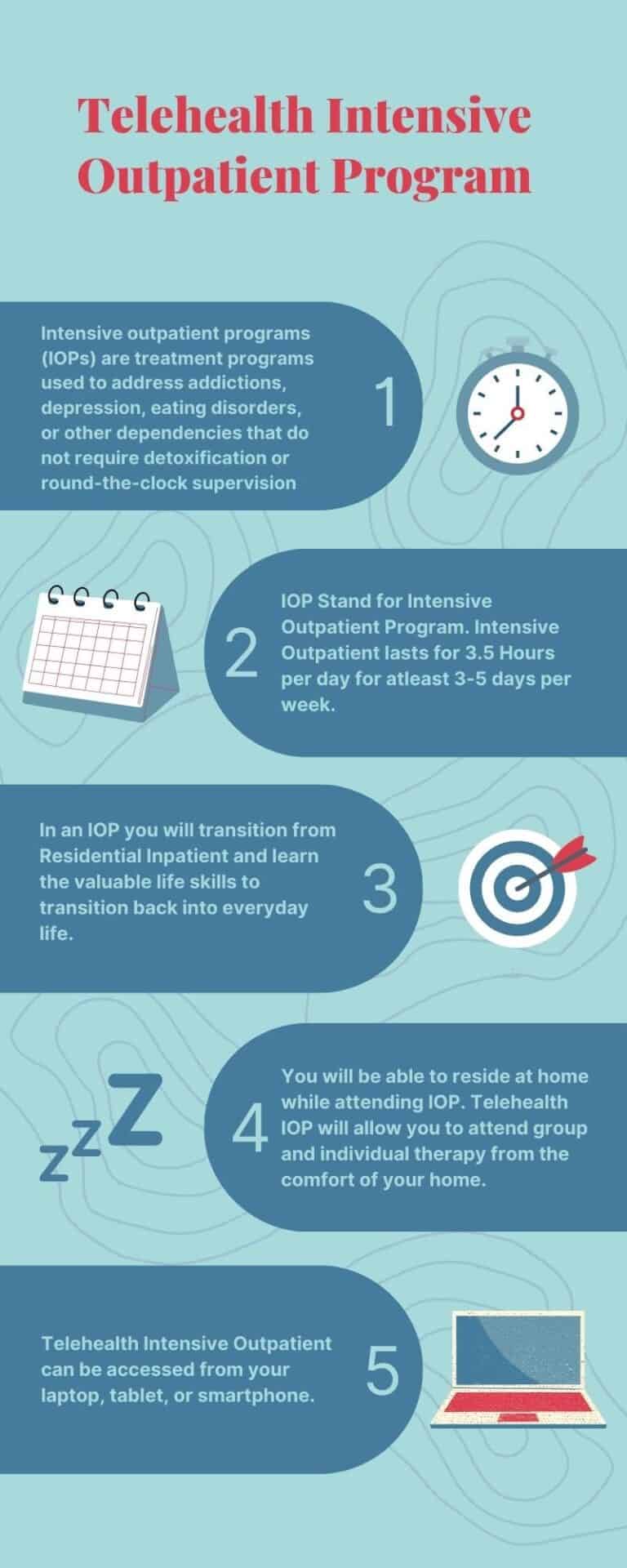Leading Factors to Take Into Consideration an Intensive Outpatient Program (IOP) for Mental Health.
Leading Factors to Take Into Consideration an Intensive Outpatient Program (IOP) for Mental Health.
Blog Article
Browsing the Complexities of Double Diagnosis Therapy Within an Extensive Outpatient Program Setting
In the world of psychological health and wellness and dependency therapy, the junction of dual medical diagnosis offers a nuanced difficulty that requires a detailed and customized technique. Within the boundaries of an Intensive Outpatient Program (IOP) setup, the intricacies of attending to co-occurring psychological health and wellness problems and material use disorders need a delicate balance of expertise and resources to browse. The integration of evidence-based practices, collaborative efforts among multidisciplinary groups, and an eager understanding of the one-of-a-kind demands of each individual are essential parts in efficiently handling dual diagnosis within an IOP structure. By discovering the complexities of dual medical diagnosis therapy within this intensive outpatient context, a clearer path emerges towards holistic and lasting recuperation for those grappling with these intertwined challenges.
Double Medical Diagnosis Summary
What is the value of recognizing twin diagnosis in mental health and wellness therapy? Dual diagnosis refers to the co-occurrence of a material use problem and a mental health and wellness disorder in an individual. It is critical to identify and resolve this comorbidity as it can significantly influence the performance of psychological health treatment. Without proper recognition and administration of both problems, people may have a hard time to achieve lasting recuperation and stability.
Recognizing twin medical diagnosis is crucial as it needs a detailed and integrated strategy to treatment. By acknowledging the interplay in between material use and mental wellness, doctor can customize interventions to meet the unique needs of each individual. This alternative approach not only addresses signs but additionally targets underlying factors that add to the twin medical diagnosis.
In addition, untreated double medical diagnosis can bring about a cycle of relapse and worsening mental wellness signs. By identifying the complexity of twin medical diagnosis and giving specialized care, healthcare experts can sustain people in attaining lasting recovery and boosted mental health.
Tailored Treatment Plans
Recognizing the elaborate interplay between substance use conditions and mental health conditions, the advancement of customized therapy plans is critical in addressing the complexities of twin diagnosis in psychological health and wellness therapy. Tailored treatment strategies are individualized approaches that think about the distinct needs, difficulties, and goals of people dealing with dual medical diagnosis. These strategies are developed collaboratively by a multidisciplinary group of professionals, including psychiatrists, psychologists, social employees, and dependency experts, to guarantee comprehensive and incorporated care.
Tailored therapy plans generally include a mix of treatments, drugs, and behavior treatments that target both the substance usage condition and the mental wellness condition all at once. These plans might consist of cognitive-behavioral therapy, dialectical behavior modification, medication-assisted treatment, specific therapy, team treatment, and family treatment, among other evidence-based treatments. By customizing treatment methods to specific conditions, tailored strategies can resolve the origin of twin medical diagnosis, promote long-term recuperation, and enhance general lifestyle for individuals struggling with co-occurring problems.
Integrated Treatment Strategy

Moreover, the social element of integrated treatment entails addressing ecological elements that might contribute to the growth or perpetuation important use and psychological health and wellness concerns. This can consist of household characteristics, housing instability, or absence of social support. By integrating social interventions like family treatment, trade assistance, and neighborhood resources, the treatment becomes much more all natural and tailored to the individual's specific demands. On the whole, an integrated care strategy in double medical diagnosis treatment within an intensive outpatient program setup intends to supply thorough, reliable, and personalized treatment to individuals encountering co-occurring disorders.
Difficulties in IOP Setting
In the context of double medical diagnosis therapy within an extensive outpatient program, navigating the intricacies of co-occurring substance use conditions and psychological health problems offers significant difficulties. Among the primary difficulties in the IOP setting is the sychronisation of care between psychological health and wellness specialists and drug abuse experts to guarantee a comprehensive therapy technique. This requires efficient Get More Information interaction, partnership, and a deep understanding of just how these conditions engage and influence each other.
Additionally, the rising and falling nature of compound use conditions and mental wellness problems includes an additional layer of intricacy - Intensive Outpatient Program (IOP). Clients in an get redirected here IOP might experience sudden shifts in their signs or compound yearnings, requiring timely treatment and adjustment of therapy techniques. Balancing the strength of therapy and assistance while permitting customers the versatility to manage their day-to-day duties can be a delicate balance to keep
Moreover, attending to stigma and resistance to treatment within the IOP setup can hinder progression. Some individuals might be hesitant to reveal their twin medical diagnosis or may feel ashamed, impeding their involvement in the restorative process. Conquering these barriers necessitates a helpful and non-judgmental environment that promotes depend on and openness.

Collaborative Specialist Initiatives

Joint initiatives also expand to routine communication and details sharing amongst staff member to ensure a cohesive therapy method - Intensive Outpatient Program (IOP). This might entail instance conferences, joint sessions with the individual, or shared documentation to track progression and adjust treatment techniques as needed. Additionally, collaboration may consist of entailing various other medical care experts such as health care medical professionals or family members therapists to provide alternative support to the patient. Eventually, an unified front of professionals collaborating boosts the performance of twin medical diagnosis treatment within an intensive outpatient program.
Verdict
To conclude, effective twin medical diagnosis treatment within an intensive outpatient program setup calls for customized treatment strategies and an incorporated care technique. Obstacles may occur in this setup, but collective efforts among professionals can aid browse these complexities. By addressing the special demands of people with co-occurring mental health and wellness and click site compound use problems, IOP programs can offer comprehensive and alternative like sustain healing and overall health.
Report this page